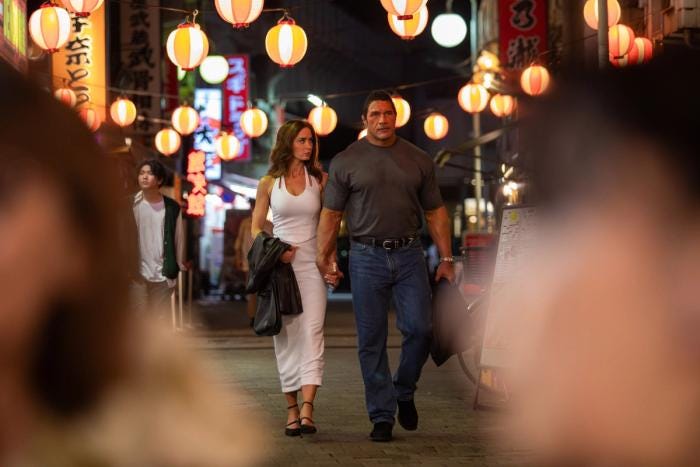‘The Smashing Machine’ is the sluggish story of an MMA pioneer
Dwayne Johnson delivers a revelatory performance as figher Mark Kerr, but Benny Safdie’s solo debut can’t justify itself.
There’s a story that The Smashing Machine wants to tell about itself, that’s independent of the story told by the movie itself: That Dwayne “The Rock” Johnson, after several years of starring in mediocre, low-effort blockbusters that had begun to affect his public standing, was making a “comeback,” once again working with a talented and ambitious director, in which Johnson delivers a performance that allows him to stretch in a way he hasn’t in many years. Might Johnson ride that wave all the way to the Oscars?
The narrative is perhaps half-right. Johnson does give a powerful performance here, which indeed represents the strongest work he’s done in quite some time. But the problem is, actors who contend for awards for their “comebacks” tend to be much-loved performers who were out of the movies for an extended period of time, not actors who are “coming back” from an extended period of bad reviews and even more unflattering stories in the trades.
Also, the movie itself is sort of terrible.
The Smashing Machine, inspired by a 2002 documentary of the same name, is the story of Mark Kerr, a huge star in the rise of mixed martial arts in the late 1990s. A mountain of a man, who cultivated something of a gentle giant vibe, Kerr battled opioid addiction while enduring a tumultuous relationship with his wife Dawn (Emily Blunt, reuniting with her Jungle Cruise co-star, and with the director whose character, Edward Teller, her character snubbed at the end of Oppenheimer).
Kerr, whose background was in amateur wrestling, mostly competed in the Pride circuit in Japan, consisting of a series of tournaments, contested in formats that the movie does a very poor job explaining.
Yes, Johnson is playing a large man, who fights in the ring, and even had his initial rise in the second half of the 1990s, around the same time The Rock was on top of the world in WWE. But he’s not, in any way, “playing himself,” or his wrestling persona, which was very different from Kerr’s. He looks very different, wearing some type of facial prosthetics, and not even his physique is quite the same as how Johnson typically looks. (That said, Johnson looks a bit more like himself in some scenes than others.)
Johnson and Blunt are both too old for their roles by a couple of decades; Kerr was around 30 for these events, and Johnson is in his 50s. However, I did enjoy Blunt playing against type as a downscale American. She played a similar part in an underrated 2023 movie called Pain Hustlers.
But what I couldn’t get past is the question of why a movie was made about this guy, why his story arc is supposed to be compelling, or why this particular story was told about him. I would imagine that Safdie, who wrote the script and directed, is a big fan of the documentary and thought it would make a good feature, especially with Dwayne Johnson as Kerr. But are we supposed to consider this guy worthy of a biopic, just because he was such a tremendous figure in the early days of MMA?
This is Safdie’s first film by himself, as he and his brother Josh, after making Uncut Gems, have joined the growing trend of brotherly directing duos going their separate ways.
The Smashing Machine just doesn’t work. While the film does what it can to get away from sports movie cliches, it’s way too slow, lacks momentum, and never really builds to anything. It’s one of those movies where it reaches the 90-minute mark and you just know that structurally, there have to be at least three more fights before the end.
Kerr’s friendship with best friend Mark Coleman (Ryan Bader) is probably the second-most important relationship in the movie, but there’s no conflict, and just about nothing interesting happens between them. It doesn’t help that Bader, himself an MMA fighter, is a non-actor, and it shows.
And finally, for all the attention paid to Kerr’s drug use… this is a film about a massive, muscular individual, in the unregulated, wild-west early days of MMA fighting, around the same time as the heydays of Mark McGwire, Sammy Sosa and Barry Bonds. Are we to think Kerr was taking steroids, or to believe that he wasn’t? And is there a reason the film doesn’t even address that?



It's interesting, the doc that this is based on very clearly addresses his steroid use and it seems bizarre to elide that detail in the feature - either way, looking forward to seeing it this afternoon.
I'm about to go see this film in half an hour and was looking for reviews on Substack( as one does) and found yours, so wanted to leave you a comment to say thank you!